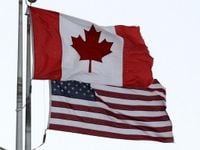A new lawsuit has been filed against the Trump administration’s controversial travel policy that requires foreign nationals to register if they intend to stay in the United States for 30 days or more. This policy, which has drawn criticism for its potential economic repercussions, particularly for communities that rely on Canadian snowbirds, was challenged on March 31, 2025, by the American Immigration Council along with several other advocacy groups.
The lawsuit targets the U.S. Department of Homeland Security (DHS), its Secretary Kristi Noem, and several other federal agencies and officials, including the U.S. Citizenship and Immigration Services (USCIS) and its director Kika Scott, U.S. Immigration and Customs Enforcement (ICE) and its acting director Todd Lyons, and U.S. Customs and Border Protection (CBP) and its acting commissioner Peter Flores. The U.S. Department of Justice and Attorney General Pamela Bondi are also named in the complaint.
The complaint argues that the interim final rule fails to consider the significant impact on communities that depend on revenue from Canadian retirees who travel to the U.S. during the winter months. It highlights that there are an estimated one million Canadian snowbirds who flock to warmer U.S. destinations each year, contributing substantially to the economy.
According to the U.S. Travel Association, Canada is the top source of international visitors to the United States, with Canadian tourists generating an impressive US$20.5 billion in spending in 2024. Experts warn that even a 10 percent reduction in Canadian travel could translate to two million fewer visits and a staggering US$2.1 billion in lost spending for the U.S. economy.
Data from CBP indicates a noticeable decline in travelers crossing into the U.S. via its northern land border. In February 2024, 2.7 million passenger vehicles passed through, a stark decrease compared to 2.2 million in the same month this year. This drop in traffic coincides with Canada’s issuance of a travel advisory warning its citizens about the new registration requirements.
The updated travel advisory page from the Canadian government includes links to the new registration form and information on how to verify the issuance of an I-94 form, which is automatically generated for Canadian travelers arriving by air. However, Canadians crossing at a land border may not receive an I-94 form, according to Snowbird Advisor.
The complaint specifically challenges the new travel policy known as the Alien Registration Requirement, which was announced in late February 2025. This policy implements an executive order from President Donald Trump titled “Protecting the American People Against Invasion.” Under this rule, illegal aliens, including Canadians, must register to stay in the U.S. for 30 days or longer. Initially, this included a requirement for fingerprinting, though Canadians were later exempted from this stipulation.
As part of the policy, foreign nationals are required to keep proof of their registration in their personal possession at all times. The complaint states that this new directive reverses decades of U.S. policy regarding foreign visitors, which historically allowed Canadians visiting for less than six months to bypass such registration requirements.
Furthermore, the complaint asserts that the defendants rushed these significant changes without proper public notice, comment, or consideration, which is mandated by Congress to prevent such harmful repercussions. The Canadian Snowbird Association, which represents 100,000 members, has expressed strong opposition to the new requirements, stating they are actively working with Congress and the Trump administration to rescind the policy for Canadian tourists. They argue that the executive order pertains to individuals unlawfully present in the U.S. and should not affect Canadian tourists visiting for leisure.
In a related context, concerns have been growing among Canadians and other non-U.S. citizens about their rights when crossing the U.S. border. Reports have surfaced of non-citizens being turned away or detained at ICE facilities, raising alarms about the treatment of travelers. Immigration lawyer Cindy Switzer recently discussed these issues, emphasizing the rights travelers have and the powers customs officials possess, including the ability to access devices such as phones.
As the April 11, 2025, implementation date for the new travel policy approaches, many are left wondering what this could mean for the future of cross-border travel between Canada and the United States. With the potential for economic disruption looming, the outcome of the lawsuit and the reactions from both governments will be closely monitored. The implications of these changes could resonate far beyond the immediate legal battles, affecting thousands of travelers and the communities that rely on their patronage.
The legal challenge to the travel policy exemplifies the ongoing tensions surrounding immigration and border security in the U.S. As advocacy groups push back against what they see as an overreach of federal authority, the case will likely serve as a pivotal moment in the discussion about how the U.S. manages its borders and the treatment of foreign nationals.
With the stakes high, both sides are preparing for a legal fight that could reshape the landscape of U.S.-Canada travel. For now, Canadians planning to visit the U.S. are advised to stay informed about their rights and the new registration requirements that could impact their travel plans.





